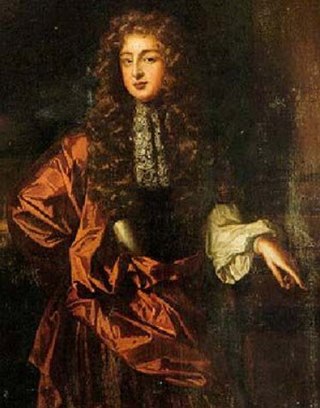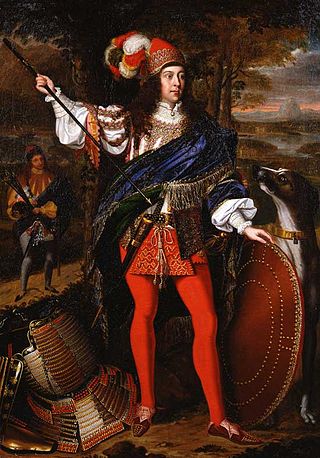Related Research Articles

The Battle of the Boyne took place in 1690 between the forces of the deposed King James II, and those of King William III who, with his wife Queen Mary II, had acceded to the Crowns of England and Scotland in 1689. The battle was fought across the River Boyne close to the town of Drogheda in the Kingdom of Ireland, modern-day Republic of Ireland, and resulted in a victory for William. This turned the tide in James's failed attempt to regain the British crown and ultimately aided in ensuring the continued Protestant ascendancy in Ireland.

The Lord Mayor of Dublin is the honorary title of the chairperson of Dublin City Council which is the local government body for the city of Dublin, the capital of Ireland. The incumbent, since June 2024, is councillor James Geoghegan. The office holder is elected annually by the members of the council.

Patrick Sarsfield, 1st Earl of Lucan was an Irish soldier and Jacobite. Killed at Landen in 1693 while serving in the French army, he is now best remembered as an Irish patriot and military hero.

The Treaty of Limerick, signed on 3 October 1691, ended the 1689 to 1691 Williamite War in Ireland, a conflict related to the 1688 to 1697 Nine Years' War. It consisted of two separate agreements, one with military terms of surrender, signed by commanders of a French expeditionary force and Irish Jacobites loyal to the exiled James II. Baron de Ginkell, leader of government forces in Ireland, signed on behalf of William III and his wife Mary II. It allowed Jacobite units to be transported to France, the diaspora known as the Flight of the Wild Geese.

The Williamite War in Ireland took place from March 1689 to October 1691. Fought by Jacobite supporters of James II and his successor, William III, it resulted in a Williamite victory. It is generally viewed as a related conflict of the 1688 to 1697 Nine Years' War.
Patriot Parliament is the name commonly used for the Irish Parliament session called by King James II during the Williamite War in Ireland which lasted from 1688 to 1691. The first since 1666, it held only one session, which lasted from 7 May 1689 to 20 July 1689. Irish nationalist historian Sir Charles Gavan Duffy first used the term Patriot Parliament in 1893.

Claud Hamilton, 4th Earl of Abercorn PC (Ire) (1659–1691) was a Scottish and Irish peer who fought for the Jacobites in the Williamite War. He went with King James to Derry in 1689 and tried to negotiate the surrender of the town with Adam Murray. He raised a regiment of horse that he led in the defeats of Newtownbutler in 1689 and Aughrim in 1691. He was killed when the ship that should have brought him to France was intercepted by a Dutch privateer.

Gustavus Hamilton, 1st Viscount BoynePC (Ire) (1642–1723) was an Irish soldier and politician. In his youth, he fought in his cousin Sir George Hamilton's regiment for the French in the Franco-Dutch War. About 1678 he obtained a commission in the Irish Army. James II appointed him to the Irish Privy Council in 1685.

Daniel O'Brien, 3rd Viscount Clare, was with King Charles II in exile during the interregnum. At the Restoration, he obtained the title of Viscount Clare for his grandfather and full restoration of the family's lands. At the Glorious Revolution he supported James II, sitting in the Patriot Parliament and fighting for him at the Battle of the Boyne. He was in consequence attainted as a Jacobite.
Sir Richard Nagle was an Irish Jacobite politician and lawyer. He held the positions of Attorney-General for Ireland, Speaker of the Irish House of Commons, Lord Justice of Ireland and Secretary of State and War for Ireland under King James II. He fled to France in 1691, joining James II at Saint-Germain-en-Laye, where he resumed his duties as nominal Secretary of State and War. He later served as Commissioner of the Household.
Colonel Gordon O'Neill, was an officer in King James II's Irish army who fought at the Siege of Derry, the Battle of the Boyne, and the Battle of Aughrim for the Jacobites.

The Brazen Head is a pub in Merchant's Quay, Dublin, built as a coaching inn in 1754, on the site of a merchant's dwelling dating back to at least 1613. lt received a licence to sell ale in 1661, and the first mention of it as an inn was in 1668.
Nathaniel Hooke (1664–1738) was a Franco-Irish Jacobite soldier, diplomatic envoy for the King of France and a Baron in the Jacobite Peerage of Ireland.
The Declaration of Finglas was issued on 17 July 1690 by William III of Ireland at Finglas in County Dublin, shortly after his Williamite army's decisive victory at the Battle of the Boyne during the War of the Two Kings.

Sir Neil O'Neill, 2nd Baronet of Killeleagh, County Antrim, was an Irish Jacobite, soldier and the Lord of Clandeboye, a powerful clan of the ancient Northern Uí Néill.
William Dongan, 1st Earl of Limerick was an Irish Jacobite soldier and peer.
Jenico Preston, 7th Viscount Gormanston, was an Irish peer, Jacobite soldier and landowner.
Sir Thomas Hackett was an Irish Jacobite official and merchant.
Sir Terence MacDermott was an Irish merchant and Jacobite politician.
Simon Luttrell was an Irish Jacobite politician and soldier.
References
- 1 2 3 Ó Ciardha, Éamonn (October 2009). "Creagh, Sir Michael". Dictionary of Irish Biography. Retrieved 14 February 2023.
- ↑ Lord Mayors of Dublin 1665 – 2020. Dublin City Council. Retrieved 14 February 2023.
- ↑ O'Hart, John, The Irish Parliament of King James the Second in 1689, Irish Pedigrees: or the Origin and Stem of the Irish Nation (5th Ed., 1892), Volume 2. Retrieved 14 February 2023.
- ↑ McNally, Michael. Battle of the Boyne 1690: The Irish Campaign for the English Crown. Osprey Publishing, 2005. p.52.